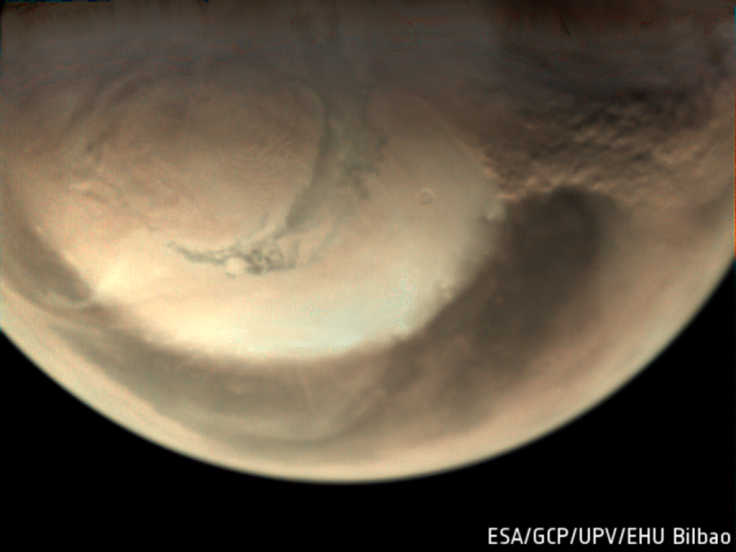Mars Photo Shows 'Active Volcano' Releasing Smoke On Red Planet?

A photo released last year showed what looked like an active volcano spewing smoke out into the atmosphere of planet Mars.
According to CNET, the photo, taken by the European Space Agency's Mars webcam on board its Mars Express orbiter, showed the large volcano named Arsia Mons with a streak-like smoke that seems to be emanating from it.
The photo caused some serious debate in the internet as conspiracy theorists and space enthusiasts believed that the volcano is already on the verge of eruption. This could finally prove that the planet still has active volcanic activities and could help determine once and for all that there might be water running underneath the planet, and with it, life.
However, the theory was debunked by scientists from the U.S. space agency, NASA, saying that what was seen in the photo is not smoke but cloud.
“It's not a plume of smoke, but rather water ice clouds condensing out over the summit of the Arsia Mons volcano. We see them quite often over this particular volcano. Here's another view of them from earlier this month from NASA's Mars Reconnaissance Orbiter,” planetary scientist Tanya Harrison, a member of NASA's Opportunity rover team and specializes in Mars geology and weather, said over Twitter. She also posted a photo showing the similar plume to prove her statement is factual.
It's not a plume of smoke, but rather water ice clouds condensing out over the summit of the Arsia Mons volcano. We see them quite often over this particular volcano. Here's another view of them from earlier this month from NASA's Mars Reconnaissance Orbiter. pic.twitter.com/aRAMrkkROc
— Dr. Tanya Harrison (@tanyaofmars) October 22, 2018
Planetary scientists have long regarded that the Planet Mars still has some volcanic activity beneath its surface and is the reason why they believe that there’s running water underground. Evidence of water in Mars used to be limited in the form of ice or vapor but a recent discovery showed there’s actually liquid water underneath the Martian South Pole.
Some scientists thought that the water was kept in liquid form via pressure from above, and by dissolved salt content. However, a newer theory made by a group of researchers who published a study in the AGU journal Geophysical Research Letters, showed that volcanic activity beneath Mars is what’s causing water to remain liquid underneath and that without volcanoes, there won’t be any water at all.
"Different people may go different ways with this, and we're really interested to see how the community reacts to it," Michael Sori, an associate staff scientist in the Lunar and Planetary Laboratory at the University of Arizona and a co-lead author of the study, said.
© Copyright IBTimes 2024. All rights reserved.





















